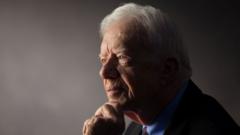Alessio Figalli, a mathematician affiliated with ETH Zurich and the Institute for Advanced Study in Princeton, delves into the captivating realm of optimal transport, a discipline that examines the most efficient ways to allocate resources from starting points to endpoints. This multifaceted area of study encompasses a broad spectrum, ranging from atmospheric phenomena like clouds to the intricate movements of bubbles and the functionality of chatbots.
Recognized for his groundbreaking work, Dr. Figalli was presented with the prestigious Fields Medal in 2018. His passion lies in mathematics that reflects and resolves tangible issues encountered in nature. He is drawn to the "sense of eternity" math offers, expressing that "it is something that will be here forever," albeit acknowledging its impermanence. There is a certitude in his belief that mathematical theorems, once proven, endure through the ages, remaining either true or false, available for reliance a century later.
The groundwork of optimal transport stretches back nearly 250 years, stemming from the insights of Gaspard Monge, a French mathematician whose work was predominantly shaped by military engineering challenges. His pioneering concepts found broader applications during the Napoleonic Era, notably in logistical issues, such as devising the optimal methods to construct fortifications while limiting material transport costs.
In a significant advancement, Russian mathematician Leonid Kantorovich received a Nobel Prize in Economic Sciences in 1975 for enhancing mathematical theories that govern optimal resource allocation. Dr. Figalli recounts an illustrative example used by Kantorovich involving bakeries and coffee shops, which centered on the daily delivery of croissants, aiming for maximum satisfaction among businesses without competitive conflicts.
This intricate optimization scenario, termed a global wellness optimization problem, showcases the interlinked dynamics of various players, emphasizing that any deviation in one bakery or coffee shop’s approach can create ripple effects that influence the entire system.
The conversation with Dr. Figalli, held at a New York City event hosted by the Simons Laufer Mathematical Sciences Institute, has been condensed for clarity, revealing the depth and breadth of optimal transport in mathematics and its relevance to societal structures.






















